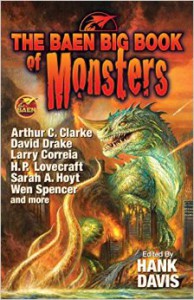written by David Steffen
“On a Spiritual Plain” by Lou Antonelli, published in Sci Phi Journal, is nominated for this years Hugo Award in the Short Story Category. Sci Phi Journal has posted the story for free for the voting period, which you can find here.
The story takes place on the alien planet Ymila, devoid of any useful resources apart from being close to a wormhole. Ymila has a single sentience species who practice a single religion based around the journey of the soul. The biggest thing that’s different about Ymila is that it has a much stronger electromagnetic field which keeps dead souls from dissipating quickly as they apparently do on Earth. Another major thing is that the Ymilans have developed specialized sensory organs that allow them to see and communicate with dead souls. A human dies for the first time on the planet, and his soul visits the human chaplain–visible only under certain conditions but unable to communicate clearly. The chaplain sets out on a pilgrimage to the pole of the planet where the magnetic field is weaker to allow the soul to dissipate.
I thought the core idea here was interesting, the concept of a intelligent-life-supporting planet which has different properties that will keep a soul in place, and the intelligent lifeforms there evolving with sensory equipment to communicate with them. I can see how that sensory equipment would give an evolutionary advantage–allowing a multigenerational learning/mentoring culture. I would love to see more stories that include religion as an important element without either preaching nor demonizing them.
But I never really felt any tension as I was reading. At the beginning of the story they set out on a journey, they take the journey with no significant obstacles, and then the journey is over. A lack of tension might be made up for by some interesting philosophy, something deep to mentally chew on, and that would certainly make sense in a publication that styles itself a journal of philosophical science fiction. The chaplain had the opportunity to speak to Joe (the dead soul) through native translators, yet for most of the journey Joe is not aware of what the purpose of the trip is. Why is the chaplain undertaking this journey without even speaking to Joe about it? Does he think that he knows what’s best for Joe better than Joe himself–why not just ask Joe what he wants to do? It seems to me that a chaplain’s role in such a situation would be to be a counselor for the dead, to help Joe come to terms with what has happened and to help Joe come to his own decision about what Joe wants to happen next. The impression I got, which is probably not what the author intended, is that the chaplain wanted Joe’s ghost to go away because it would raise awkward questions among the congregation to have a ghost hanging around. If he simply wanted Joe to go on to the afterlife, why rush it? The pilgrimage could be taken at any time whenever Joe felt that he was ready–the native souls usually moved on after six generations, as a natural progression of their relationship to the living populace, so I would expect Joe to eventually decide to do the same if he weren’t rushed into it. If the answer to these questions wasn’t the rather negative conclusion I jumped to, then I felt the story could’ve supported whatever was intended more strongly.

